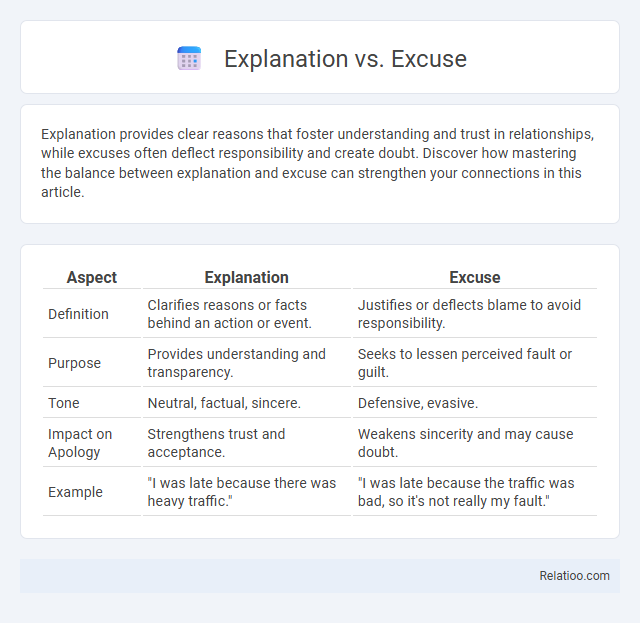Explanation provides clear reasons that foster understanding and trust in relationships, while excuses often deflect responsibility and create doubt. Discover how mastering the balance between explanation and excuse can strengthen your connections in this article.
Table of Comparison
| Aspect | Explanation | Excuse |
|---|---|---|
| Definition | Clarifies reasons or facts behind an action or event. | Justifies or deflects blame to avoid responsibility. |
| Purpose | Provides understanding and transparency. | Seeks to lessen perceived fault or guilt. |
| Tone | Neutral, factual, sincere. | Defensive, evasive. |
| Impact on Apology | Strengthens trust and acceptance. | Weakens sincerity and may cause doubt. |
| Example | "I was late because there was heavy traffic." | "I was late because the traffic was bad, so it's not really my fault." |
Understanding the Difference: Explanation vs Excuse
An explanation provides a clear, factual account of why something happened, aiming to enhance understanding without shifting blame. An excuse, however, often attempts to justify or minimize responsibility, potentially undermining accountability. Understanding the difference between explanation and excuse is crucial for effective communication and fostering trust in personal and professional relationships.
Defining Explanations: What Makes a Reason Valid?
A valid explanation provides clear, evidence-based reasoning that directly addresses the cause or purpose of an event, distinguishing it from mere excuses or justifications. It relies on facts, context, and logical coherence to clarify rather than deflect, enabling you to understand the true motivation or circumstances involved. Understanding this difference ensures your responses are credible and grounded in truth rather than evasiveness.
What Constitutes an Excuse?
An excuse constitutes a justification offered to lessen blame or responsibility for an action, often perceived as avoiding accountability rather than providing truthful clarity. Unlike an explanation, which objectively clarifies reasons behind behavior or events without intent to deflect fault, an excuse tends to minimize consequences and can undermine credibility. Understanding what constitutes an excuse is crucial for differentiating sincere communication from attempts to evade responsibility.
Psychological Motivations Behind Excuses
Excuses stem from psychological motivations such as the desire to protect self-esteem, avoid blame, and reduce anxiety associated with failure or criticism. Unlike explanations that provide objective reasons, excuses often involve cognitive biases like self-serving bias, where individuals attribute failures to external factors to maintain a positive self-image. Understanding these motivations reveals how excuses function as defense mechanisms that distort reality to preserve psychological well-being.
Truthfulness and Accountability in Explanations
Understanding the difference between an explanation, an excuse, and a justification hinges on truthfulness and accountability. An explanation provides factual context for Your actions, focusing on the objective reasons without deflecting responsibility. An excuse often shifts blame or minimizes fault, compromising honesty and accountability, while a justification accepts responsibility but frames actions as reasonable or necessary under the circumstances.
Impact on Relationships: Explanations vs Excuses
Explanations provide clear reasons behind actions, fostering understanding and trust in relationships by showing accountability and respect for others' perspectives. Excuses often deflect responsibility, potentially damaging trust and causing misunderstandings that strain connections. You can strengthen your relationships by choosing transparent explanations over excuses, promoting open communication and empathy.
Workplace Dynamics: When Explanations Sound Like Excuses
In workplace dynamics, explanations that sound like excuses can undermine your credibility and hinder team trust. Effective explanations provide clear, factual reasons for actions without deflecting responsibility, helping maintain accountability and transparency. Understanding the subtle difference is crucial for fostering honest communication and improving collaboration within your organization.
Identifying Excuses in Communication
Identifying excuses in communication involves recognizing when reasons given are intended to avoid responsibility rather than clarify facts. An explanation provides clear, factual details to help others understand a situation, while an excuse shifts blame or minimizes accountability, often lacking concrete evidence. Your ability to distinguish between genuine explanations and excuses enhances honest communication and effective problem-solving.
Turning Excuses into Honest Reflections
Turning excuses into honest reflections involves recognizing the difference between deflecting responsibility and providing genuine reasons for actions. Explanations offer clear, fact-based insights that illuminate causes without avoiding accountability, while excuses often serve to justify mistakes or failures superficially. Embracing honest reflections fosters personal growth by promoting transparency, learning, and meaningful problem-solving.
Strategies for Giving Effective Explanations
Effective explanations require clarity, relevance, and honesty to ensure the audience fully understands the context and reasoning behind an action or event. Strategies include providing specific details, addressing potential concerns without deflecting responsibility, and maintaining a neutral tone to avoid sounding defensive or making excuses. Using structured communication techniques such as the "what, why, and how" approach enhances transparency and trust between parties.

Infographic: Explanation vs Excuse
 relatioo.com
relatioo.com